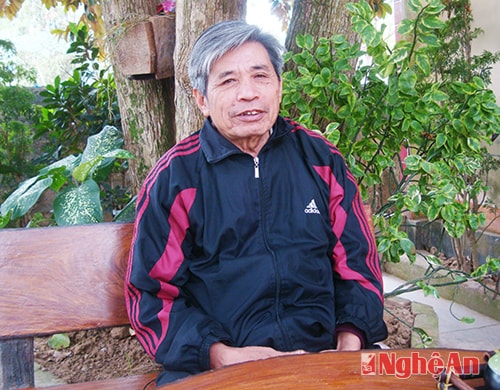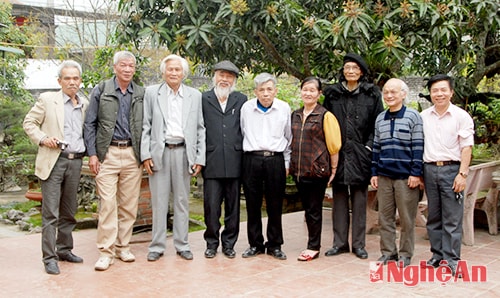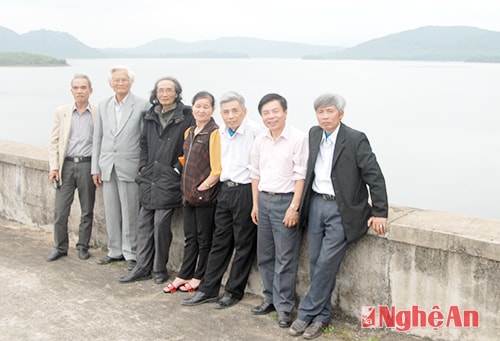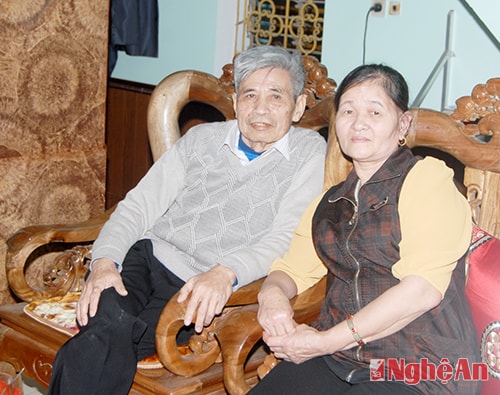The mark left by the author of "The bridge connecting the shores of joy"
(Baonghean.vn) - Phan Van Tu (from Lien Thanh, Yen Thanh), a veteran member of the Nghe An Literature and Arts Association, author of the famous poem "The Bridge Connecting the Shores of Joy" passed away at 9:30 p.m. on August 7, 2014 (July 12, Giap Ngo year) after months of serious illness. Passing away at the age of 74, he left behind much sorrow for his family and a void in the hearts of his literary friends....
In his literary career, up to 2014, both jointly and individually published, Phan Van Tu had 10 poetry collections and received 1 award (Magazine).
 |
| Poet Phan Van Tu |
I say that because the marks that Phan Van Tu left on us were the years when he had not yet won any awards. Those were the years of the eighties, the twentieth century.
When first meeting him, if you are not a literary person, no one would think he is a poet. He is like a farmer, because of his strong physique, because of his beloved wife's eight acres of contracted land, he alone plows, harrows, and pulls the shaft! No poetry lover can imagine that person, that style, he has poems, verses that have become the subconscious of many generations:
The bridge is our meeting place
On a moonlit night at the foot of the bridge I wash my clothes
Moonlit night on the bridge he plays the flute
Bridge connecting the shores of joy.
The bridge “connects the shores of joy”. It’s so familiar that many people feel “nothing at all”. But it is a very lyrical and romantic poetic image! Read or sing, the poetic image will move the soul, make us flutter, love life more! That’s why the poem was written a long time ago, during the war, but it still lives with time. And more importantly, it always captivates people’s hearts, especially couples who are dating and in love.
Listen to the song "Bridge connecting happy shores":
[audio(1937)]
 |
| Artists in the province took souvenir photos with poet Phan Van Tu and his wife at his private home. |
If we look at it with ordinary eyes, we can easily misunderstand that Phan Van Tu seems clumsy because of his austere appearance, slow demeanor, quiet, and yielding. When sitting and talking, reading or commenting on poetry, he gives in to everything. But don't think you can bully that person. He is a sword hidden in a banana peel. He has bright eyes under thick eyebrows and always looks straight, facing the person talking. And the most important thing is that he looks straight at life. Artists often have that perspective, but not all, not even many. Phan Van Tu is among the few. That is the second mark he left in the hearts of his friends.
 |
| Poet Phan Van Tu and members of Yen Thanh Literature and Arts Association on a field trip |
Since the eighties, that is, twenty or thirty years ago, social life at that time was very different from now. It seemed that everyone lived in one direction, looked in one direction, and spoke in another direction! If anyone said something a little contrary, they would only say it in a low voice, in private. Phan Van Tu looked in the opposite direction and spoke in the opposite direction (in fact, he did not say it in the opposite direction but spoke the truth, because he dared to look at life for real, something that many people avoided). More courageously, he put unusual things in life into poetry. The poem "1985 in my village" is a typical example. The structure of the poem is built on a village story. Tell it like it is, tell it like it is, very naturally, without a single comment. And it is these natural events that reveal social issues - that is the poet's skill. For example:
Mr. Lich, Deputy Director of Finance
Just celebrated building a big house last year
This year we celebrate our hundredth grandchild.
Go to Finance School
or:
Mr. Cam, head of department
Appointed as head of district agriculture and forestry department
Also vest, beret, car pick up and drop off
The poem was born like a whirlwind. Readers discussed it excitedly. Commune and district levels were indignant. Phan Van Tu was like a rock!
He also has a straightforward perspective, looking at life honestly. He has encountered some party members who tarnish the Party's reputation, wearing the Party's coat for personal gain:
When the solemn music begins
Someone stood with his head bowed solemnly in silence.
But in the heart still full of calculations
Hands in pocket counting money.
(Thinking about the Party)
In the eighties of the 20th century, daring to look at and write like that was not easy, not everyone could do it.
 |
| Poet Phan Van Tu and his wife Photo:Lake Cac |
Also during these years, the years when the bureaucratic subsidy mechanism was still very heavy, the lives of workers, especially those who worked for a salary, not excluding artists, were so poor that they did not have enough to eat or wear! During those years, I also dabbled in writing poetry, which is how I got to know Phan Van Tu. When I went to the provincial radio station, I lingered, asking for the guard to enter the gate. After entering the gate, I timidly asked for Phan Van Tu's room. I thought I had entered the wrong room (at that time I did not know him). In my mind, I was imagining the living and working place of a poet and editor of a radio station, which must be proper and luxurious, when what caught my eye was a room with two shabby doors with three or four holes (later I learned that the holes were there so that acquaintances who came to see him could leave their articles in his room)! The house was divided in half by reed leaves into two rooms, back to back. The rickety bed was covered with a torn cotton blanket. On the wooden editing table, half of it was a pile of manuscripts - mostly poems, the other half were two pots, one for cooking rice, the other for stewing herring, lined with two sheets of soot-stained paper...
That wandering life of the artist was recreated by him in the poem “Quanh chieu ruou” (1988), a poem that made a strong impression on readers and was highly appreciated in his poetry career. Granted, the poem does not stop with this meaning, but the mark that the poem leaves is his inherent “merciless”, unadorned, unobtrusive view. Poor poets who “check their pockets” can only afford to buy a bottle of white wine! So when “the wine runs out last night”:
Wind opens the door
Morning sunshine
About the old beggar
(I thought there was a party so I came in and cleaned the dishes)
Open our arms to you
Buy a bottle of wine on credit at a familiar bar again.
The poem ends in a painfully unexpected way, and the poet is moved. Phan Van Tu carried the beggar up to sit with the poet.
Phan Van Tu's poetry career, of course, is not only that. The marks he left in the hearts of his literary friends are also not only that. But just that much, it is not easy! Those are the marks of a poet who always lives true to himself, speaks his heart. Just living truthfully, speaking truthfully, but not everyone can live and speak. Perhaps, this is an extremely precious quality of each person in general and especially for those who do literature and art in particular. I really appreciate those simple and very beautiful things of him.
Nguyen Viet Hoa
